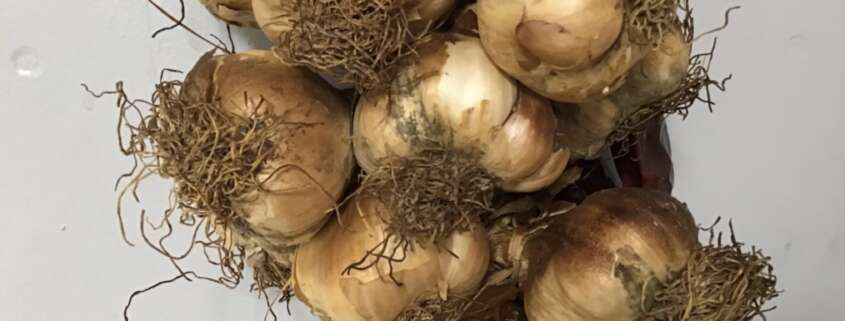Spices
They are called spices, they are garlic, onion or shallot. It’s time to plant them, and also to know everything about vegetable bulbs!
On the way to a stroll in the food garden!
Spices
In general, “spice” is a generic name used to refer to substances of plant origin, often in the form of seeds, fruits, roots, bark or leaves. All these “materials” which are used to flavor, color or preserve food. These substances can come from various parts of plants, and they are often harvested, dried, and ground before being used in cooking.
Spices are valued for their distinct flavors, intense aromas and aromatic properties, which can add depth and complexity to dishes. They are also used for their ability to improve food preservation and mask unwanted odors or tastes.
A little genius must have considered that our vegetable bulbs really corresponded to these different definitions. So here we are with vegetable bulbs that we also call “spices”.
What are we talking about ?
Garlic, onion and shallot… Whatever the variety, these are plants belonging to the Alliaceae family. And they come from different corners of the world!
It is estimated that the cradle of origin of onions is located in Central Asia, particularly in the regions which correspond to present-day Iran and Afghanistan.
For garlic, it’s in the same area. It has been used for millennia as both a food and a medicinal plant.
Shallots originate from the Middle East, where they were already cultivated at the time of the ancient Egyptians. They are now quite often associated with French cuisine.
These three plants have a long history of culinary and medicinal use in many cultures around the world. Suffice to say that they are known to everyone… And everywhere!
And when do we plant them… Spices?
Planting times vary slightly depending on your geographic location and local climate conditions.Garlic is usually planted in the fall in temperate regions. You can plant garlic about 4 to 6 weeks before the first frost. This gives it enough time to develop roots before winter.Onions are often planted in early spring. You start planting onion bulbs as soon as the soil can be worked, usually when the temperature of the vegetable garden soil reaches 10 to 15 degrees. Onion seeds can be sown a little earlier, from late winter, depending on the climate.Shallots are established like onions at the beginning of spring. As with onions, wait until the soil warms up.And if you forgot in the fall, or, if in your country, it’s bitterly cold in winter, don’t worry, we’re taking care of everyone right now and until the arrival official spring!The ideal?First, the nature of the soil…Onions, garlic and shallots thrive in well-drained soils, rich in organic matter and slightly acidic to neutral. In summary, it works less well in heavy soils.To plant, simply bury the bulb approximately its height… If it is 2 centimeters in diameter… have you guessed? Well yes, we bury it 2 centimeters, it’s that simple!Remember to weed occasionally to remove weeds that act as competitors.And then, you might say, it’s simple, you just have to let it grow.One more detail, these bulbs generally prefer a sunny exposure, with at least 6 to 8 hours of direct sunlight per day. So choose a location in your vegetable garden that is suited to this need.
Certified varieties?
Like other plants, onions, garlic and shallots are certified for several important reasons.This “certification ensures uniform selection of their genetic stability. Simply put, plants from these varieties are more likely to produce consistent results in terms of size, shape, color and yield.Another advantage is that certified varieties are tested for resistance to diseases and pests. This allows market growers and gardeners to end up with varieties that are less likely to be affected by problems such as rot, fungal diseases or insect attacks.In addition, they are monitored on their agronomic performances, such as yield, maturation time, tolerance to environmental conditions… This information helps farmers choose the varieties best suited to their specific growing conditions.
Easy !!!
Like tulip, hyacinth or dahlia bulbs, vegetable bulbs are extremely simple to grow. And if you want to get started in the vegetable garden, don’t hesitate, success will be 100% assured.On the balcony or terrace, in a balcony box or in a pot, it works too! Get started! And what’s more, it’s so good.You know everything or almost… It’s up to you!




Leave a Reply
Want to join the discussion?Feel free to contribute!